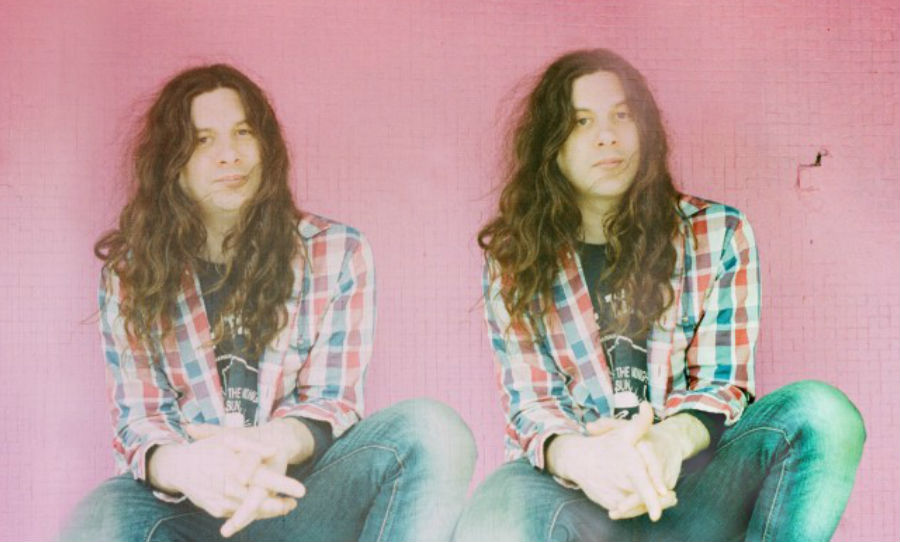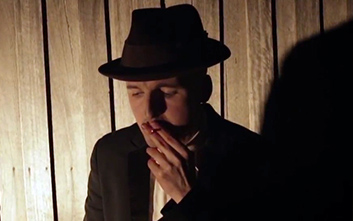In March, The Cat Empire’s Harry James Angus released his new solo album The Struggle With Glory; a soul, jazz, and gospel record that centres around the stories of Greek mythology.
It sounds like something that could be difficult to pull off… but rest assured, Angus pulls it off. Next month, the artist will be taking this new project to the stage as part of Brisbane Festival, so we caught up with the man himself to chat about writing the album, playing in people’s living rooms, and the value of Greek mythology on modern life.
Ahead of his set at Brisbane Festival this September, we caught up with Harry James Angus to chat busking, Greek mythology, and playing in people’s living rooms.
HAPPY: It’s been a couple of months now since The Struggle With Glory came out… and something I find really interesting about the album is its incorporation of Greek mythology. It’s not necessarily your typical subject matter for a soul record. Where’d the idea to write about this come from?
HJA: Yeah well I’ve always got a hundred ideas running around my head… and I’ve always been interested in Greek mythology, and I was actually reading a bit of it to my kids, and I thought “these would make awesome songs.”
They’re these great stories, and they’re quite simple but they usually deal with really interesting, universal themes – which is kind of all you’re looking for in a great song. And I think I was sick of writing about myself.
We’ve got so much we can learn from Greek mythology, and a lot of people I know aren’t religious and they don’t have any of that old-school, cultural knowledge… so taking the greek myths and putting them into songs is an interesting way of bringing those older themes and stories to the forefront again.
HAPPY: With a lot of the songs, you’ve taken these myths and given them a modern interpretation… do you think these ancient stories still have value to a modern audience?
HJA: Yeah I really do. Maybe more than ever. They reveal a side of human nature, you know… there’s two things: there’s the way people are and there’s the way people want to be, or the way that people think they should be – and they’re not necessarily always the same thing.
We repress a lot, and we hide a lot. I think what these Greek myths are really good for, is they show you that side of human nature that’s a bit more ancient. They show you that you’re like that too.
You may be a really nice guy to everyone, and go to the gym, and be fun at parties… but you also have this great scope to your nature, and that’s revealed in Greek mythology.
What’s great about the Greeks and the way they looked at their Gods, is that they viewed them as people without the constraints of society. So then the question is, what’s good? What’s bad? What’s real? And what’s fake? These are such relevant questions for today.
HAPPY: One of the most interesting interpretations on the album is your take on the Theseus and Minotaur myth…
HJA: Yeah for sure.
HAPPY: I believe this was the first song you wrote, in fact?
HJA: Yeah that was the first I sat and wrote. It was also probably the first Greek myth I ever heard. When I was a kid, we used to travel to Western Australia maybe three or four times a year, and we had this tape with these stories on it – and one of them was the story of the minotaur.
The Minotaur is so interesting, and there’s so many different interpretations and theories of where it came from. What I like about the Minotaur is… well he was a monster, but was he born a monster or was he made into a monster? And that’s probably a question that didn’t get asked a whole lot three-thousand years ago.
From a modern perspective, it’s like “well yeah, he was a kid and you threw him into a black labyrinth for his whole life… that’s gonna fuck anyone up.” So that’s interesting for me, talking about masculinity and all the weird ways that men and their fathers kind of shoot themselves in the foot, because they’ve been neglected themselves.
HAPPY: I’ve heard that when you play this project live, you explain the stories before each song…
HJA: Yea if I feel like the audience wants to hear it. Occasionally I feel like I’ve rambled on too long about them, but usually I’ll say a bit of this and a bit of that. Even just explaining the basic plot of the story, so you know what the hell I’m singing about. It’s not like a scripted show where I say the same thing every night.
HAPPY: Speaking of the live show… late last year you did this really cool thing where you went and played in people’s houses… what was it like playing in such an intimate setting? And why did you go out and do that in the first place?
HJA: Yeah, it was really fun. I guess the main reason I did it was to gather the material. It was a no pressure environment, so I could test out new music and find out what worked and what didn’t work.
A funny thing has happened to me over the past couple of years… I used to be a busker, and then I was doing that kind of musician thing that you do where you take any gig you can get – whether it’s a wedding or a birthday party or playing in the background at a cafe – you really need to find ways to connect with people who don’t give a shit about you.
Especially when you’re busking… people will just keep on walking, so the challenge is “can I play something that’s beautiful enough or interesting enough that’s gonna make them stop and give me some money?”
So then when The Cat Empire started out, I felt like I had this amazing ability to fly by the seat of my pants and connect with people. But then this really weird thing happened when we started getting more well-known… we became much more professional, and it became much more of a show.
We were mainly playing to crowds of thousands of people. You step out on stage and everyone knows your songs and everyones happy to see you and everyone’s happy that you’re there… and it’s kind of easy in a weird way.
It’s kind of much easier than busking on the street. I realised that I’d forgotten all my old tricks… I’d forgotten how to capture people who hadn’t already decided I was great. So the house concerts were a really great opportunity to re-learn some of those skills – connecting with people on a very immediate, face-to-face level.
HAPPY: Of course now you’re back playing some of those bigger shows… is it ever difficult translating a conceptual album like The Struggle With Glory to a big audience?
HJA: Well so far I’ve found people are really open to it. I think most people are really open to learning things… it’s the same reason we all love podcasts so much. People love to increase their general knowledge.
So when I talk about Greek mythology, nearly everyone is like “yeah I’d like to know more about that.” It’s really rare to find someone that would be like “yeah, get on with it.” And then when it comes to the music… well, the musics actually quite simple. There’s nothing too complicated about it.
HAPPY: Earlier you mentioned that you’ve always got a hundred ideas running around your head… are there any ideas you’re brewing up at the moment that you’d care to share?
HJA: Well there’s nothing 100%, but I do kind of feel like vocal harmonies is a really interesting area, and there’s a lot of interesting work to be done there. I feel like I’m writing more and more, thinking about this world of vocal harmony… and there’s these great singers who can just nail anything. It’s something we don’t hear that often these days.
You hear bands doing backing vocals, but a really great vocal harmony group… it’s kind of become the realm of these really cheesy, Manhattan, finger-clicking cabaret show people. But if you took that level of harmony singing and applied it to really interesting contemporary music, I reckon there’s so many possibilities there. So that’s something I’m interested in.
Catch Harry James Angus live at Brisbane Festival. Details below:
September 28th – The Tivoli
More info here.


